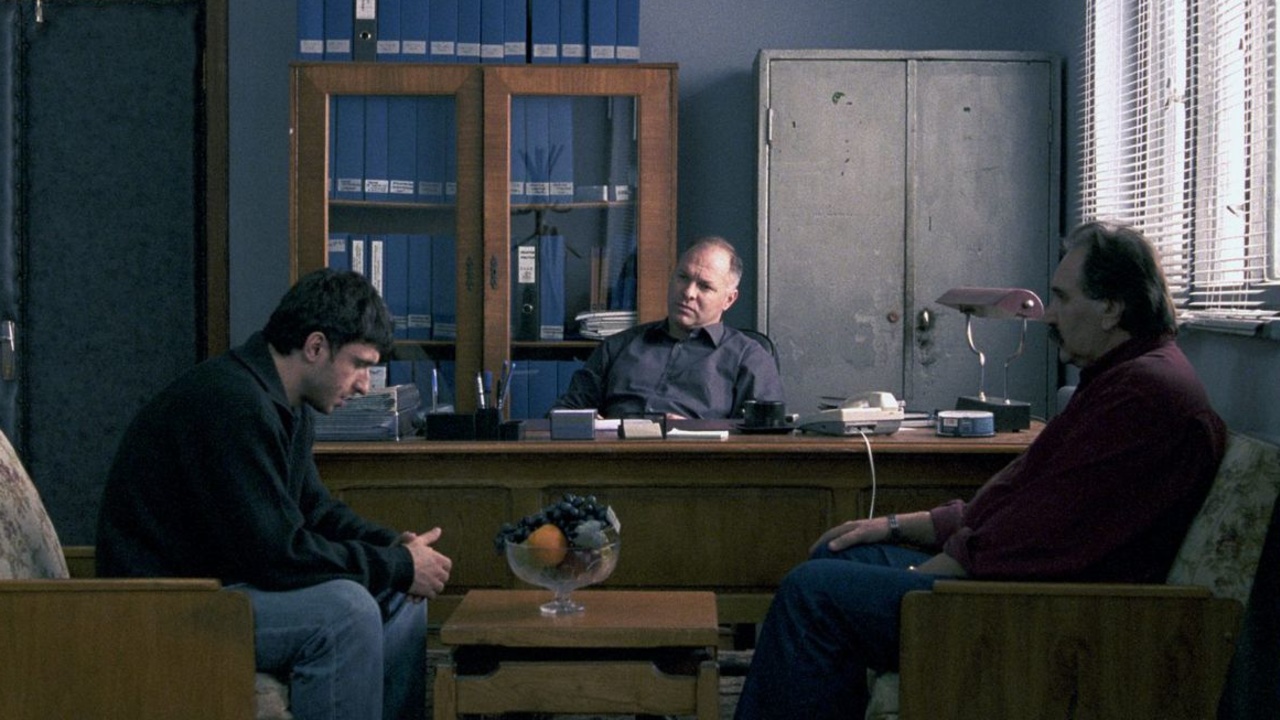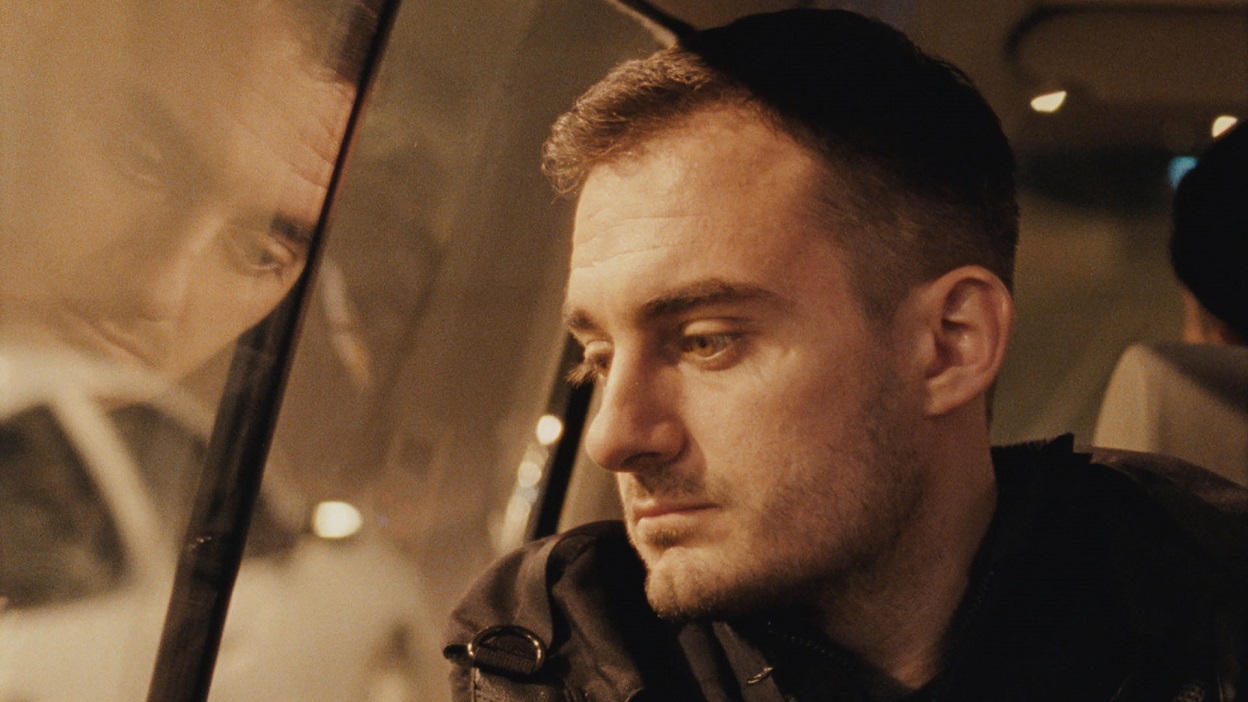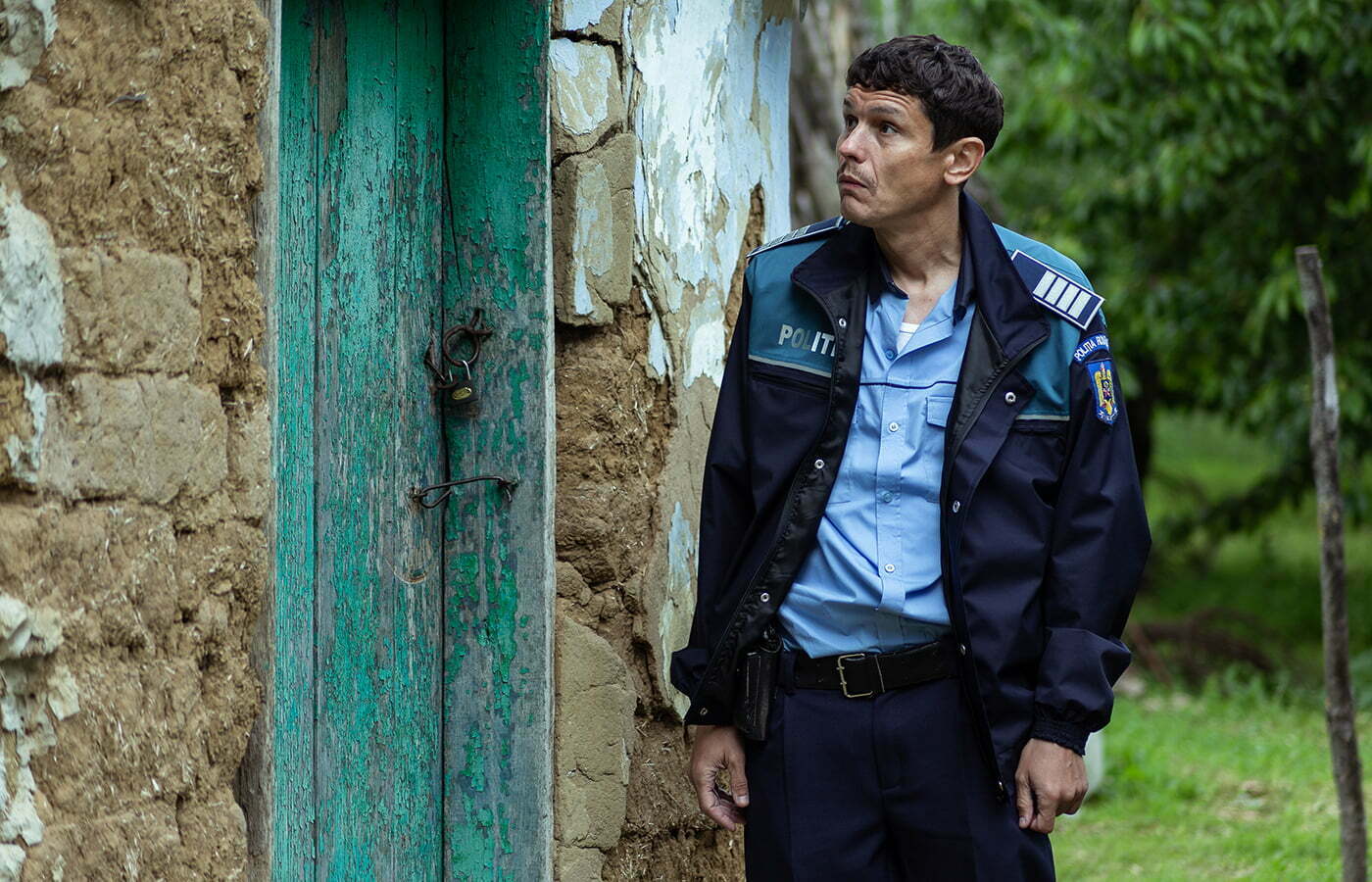Cops and Robbers. Four policemen in Romanian cinema
After recently watching Paul Negoescu’s latest film, I realized that the post-1989 cinema has no shortage of memorable police officer roles, despite the lack of local genre cinema. It’s true that unlike the propaganda films or comedies that humanized the Communist Romanian Militia in the B.D. series, the most recent efforts explore issues of conscience or the contrast between the self-image and the public image of the policeman, the corruption of the system, or even the relativization of justice. From the films that question even the job description of the policeman with language as the bearer of truth to those exploring conflicts of interests, the role is fruitful, reflecting not only the depicted period of time but also a focus on introspection and analysis, a critical look at the social role of officers.
Dragoș Bucur in Police, Adjective (dir. Corneliu Porumboiu, 2009)

A classic of the New Romanian Cinema, Police, Adjective starts from a basic procedure in police work: surveillance, i.e. following the suspect in order to prove their guilt. While on the mission, the protagonist, policeman Cristi (played by Dragoș Bucur), has moral issues with busting a group of pot-smoking teenagers. By observing the professional observer, the director demystifies police work, placing it in a routine similar to any other job, with its repetition and idle time, with colleagues with whom you can resonate more or less. By far the most anti-police role among the ones mentioned in our top, portrayed through long takes and general shots, Cristi is a guy who questions authority and its mechanisms without crossing over to the other side, of the anti-hero or the outlaw vigilante. Despite his profession, he regards the law as a citizen, relying rather on his common sense. In the memorable semantics scene, where the protagonist is forced by Captain Anghelache (played masterfully by Vlad Ivanov) to search for the meaning of the word “policeman” in the dictionary and read it out loud, two different views on law enforcement collide. Porumboiu shows through the maieutic approach, i.e. the passive-aggressive session where the chief inspector tries to convince his subordinate of the righteousness of law enforcement, two totally opposite manners of exercising power: literal vs. based on emotional grounds.
Vlad Ivanov in La Gomera (dir. Corneliu Porumboiu, 2019)

Vlad Ivanov plays in La Gomera a more evolved version of his character in Police, Adjective, that of the well-versed policeman, who always wins and knows how to evade the law quietly. In a spectacular paradigm shift, Captain Anghelache’s interest in language turns here into an adventure fit for a neo-noir, where the protagonist Cristi trains in the art of dissimulation, learning the native whistling language used by the inhabitants of La Gomera in the Canary Islands. Far from the minimalistic approach adopted ten years earlier, Porumboiu builds a complex plot, in which Ivanov’s impassive attitude leaves room for interpretation on which side of the law he stands. At one point he offers to buy his way out of a compromising situation with the payoffs from that very dirty business. Other times he investigates, frames, and brings out the entire arsenal of the police force to shake up the network og gangsters, in a display of power inspired by unclear purposes. Like the villains he deals with, Cristi is unpredictable and opportunistic, the dignitary who would sell anyone out and get away with it. Caught between three women, the mother, the boss, and Gilda, very much the epitome of femme fatale, the police inspector behaves as an emotionally void cynic, in playful contrast to the cited film references: from John Ford’s western The Searchers to Sergiu Nicolaescu’s A Police Superintendent Accuses, indicating the crisis of authority and the corruption that plague the institution.
Conrad Mericoffer in Poppy Field (dir. Eugen Jebeleanu, 2020)

I may have cheated a bit with this one; the character played by Conrad Mericoffer (Cristi) in Poppy Field is not exactly a policeman, but he is affiliated with an organ under the authority of the Ministry of Internal Affairs tasked with maintaining public order, that of the gendarmerie. The film is divided, like the protagonist, into two opposing sides – public life vs. private life. Inspired by real events (a couple of years ago, screenings at a local cinema were interrupted by an ultra-nationalist, homophobic group accusing homosexual propaganda), Poppy Field starts from the simple premise that one of the gendarmes called in for intervention at the movie theatre may be gay himself. Mericoffer’s performance supports his character’s inner struggle as a person working in a homophobic and patriarchal environment, which upholds a type of masculinity that does not allow weakness. This repression stops him from enjoying even the private moments, Jebeleanu often resorting to close-ups that show him tense and pensive. Cristi is uncomfortable and troubled by all sorts of suspicions, and that’s because he is miserable in his own skin. He reacts all violently when confronting a former lover during the intervention at the movie theater meant to defuse the conflict between the spectators and the extremist group. The threat that his sexual orientation could come to light, leading to him losing his social status, gives way to the character’s internalized homophobia. But like the spectators who live in the tolerant bubble of the cinema, Cristi postpones the moment of disclosure, opting for the protection given by interiors and becoming hostile to get validation and allay all suspicions. Caught between two worlds, the turmoil on the character’s face is extremely well captured, as he realizes that coming out would destroy his authority. Neither he nor the Romanian society is ready for a gay gendarme.
Iulian Postelnicu in Men of Deeds (dir. Paul Negoescu, 2022)

The fourth feature by Paul Negoescu stars Iulian Postelnicu as Ilie, a policeman in a remote village in Moldova. Since city life didn’t agree with him, Ilie settles for a seemingly unchallenging job in the countryside, where he tries to build a comfortable life for himself. Here he deals with minor tasks such as ensuring no fishing on the nearby lake or providing aid in case of flooding. Postelnicu gives an excellent performance as the useful idiot, with body language that denotes obedience to the actual rulers of the village, the priest and the mayor. Most of the time he comes as a joke, and rather pathetic, including the old police car that he drives on the dusty streets of the village, inspiring anything else but “safety and trust”. His attire is the epitome of resignation, with his uniform often incomplete and ill-fitting, and his shirt hanging carelessly out of his trousers. Ilie shows interest in his physical appearance in the film’s only law enforcement moment when he fixes his cop hat before acting as a sheriff determined to restore order. Built as a character study, Men of Deeds changes the tone and reveals a different side of the protagonist when a new policeman is assigned to the village, who turns out to be the opposite of Ilie, physically and professionally. Despite this convenient narrative trick, the character is not the complete loser as seen through the eyes of the younger colleague, but a pawn brought down by the power games in the system.
Film critic and programmer, she collaborates with various international film festivals. Her writing has appeared in publications such as Senses of Cinema, Kinoscope, Indiewire, Film Comment, Vague Visages and Desistfilm. In Spanish she has written for Caimán Cuadernos de Cine and in Romanian she collaborates with FILM magazine. Programmer and coordinator of Tenerife Shorts.


